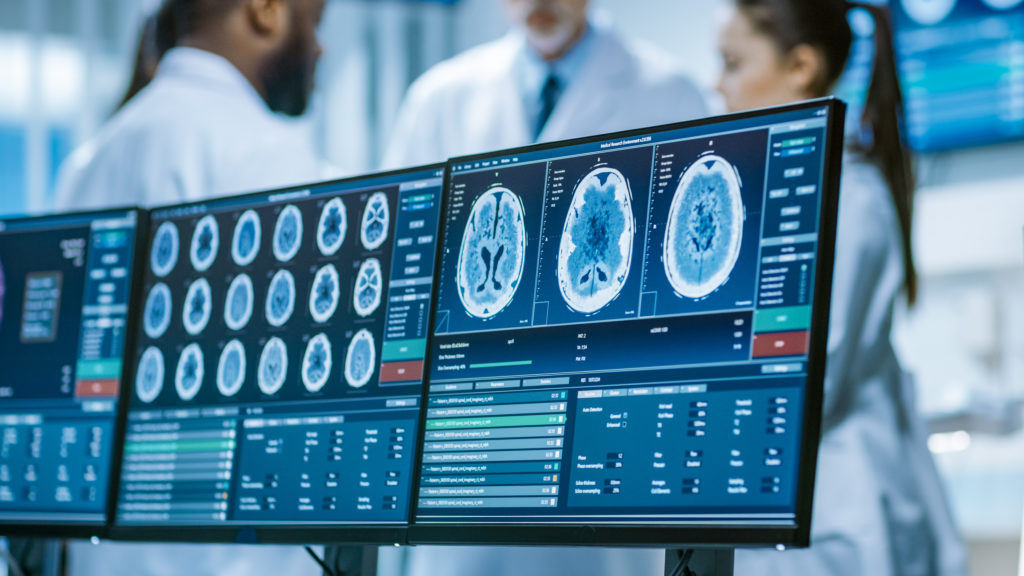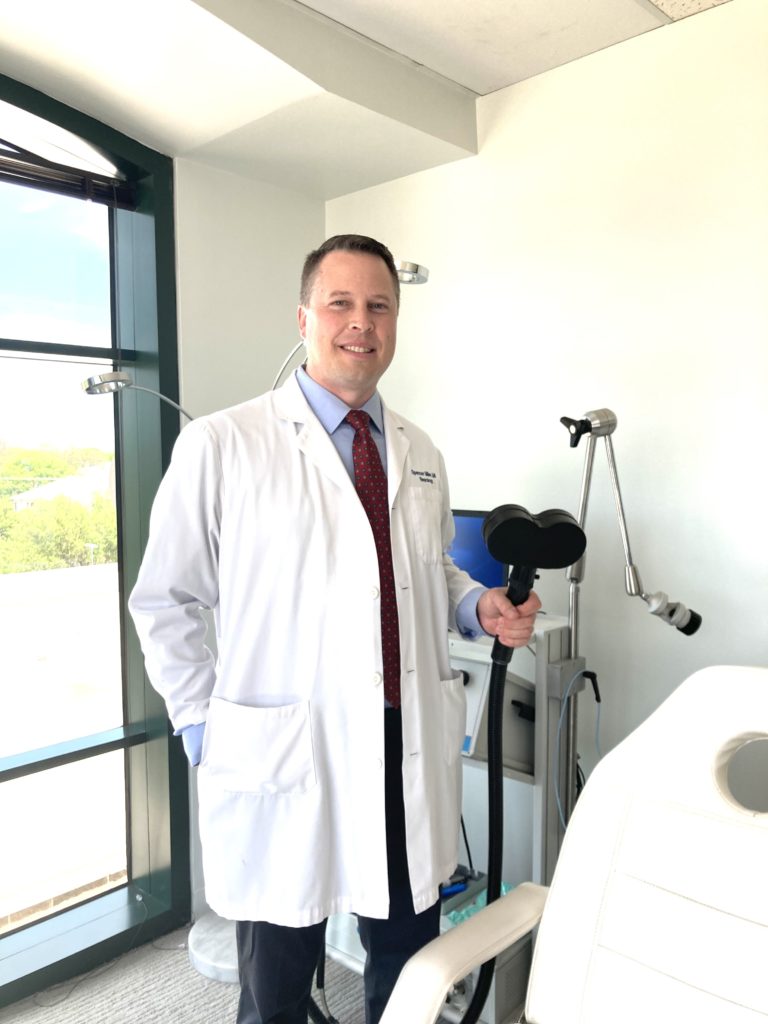TBI Treatment with MeRT
Breakthrough Treatment for Traumatic Brain Injury
Are you suffering from long-term symptoms after a concussion or TBI?
Would you like to be free from headaches, dizziness, nausea, or memory problems?
MeRT (Magnetic e-Resonance Therapy) is a non-invasive, drug-free protocol that uses sophisticated diagnostics to develop a highly tailored treatment plan.
We use magnetic waves to gently stimulate precisely targeted areas of the brain which can result in significant symptom improvement.

Feel free to
Call us anytime…New Treatment for Traumatic Brain Injury
Effective Treatment for the Long-term Effects of Head Injuries
If you’ve experienced a traumatic brain injury or concussion, then you know how miserable the symptoms can be: headaches, dizziness, nausea, memory problems, and more.
These symptoms typically resolve over time if it’s a mild concussion. But sometimes the symptoms are more severe. And they don’t get better, despite all manner of treatments and medications.
That’s when life often becomes unbearable. And that’s when you need a different solution. A new solution. One that has helped thousands overcome the painful, debilitating symptoms of Traumatic Brain Injury.*
We have that solution. It’s called MeRT, or Magnetic e-Resonance Therapy.
* Results are based on active and strict observation of our regimens. Results may vary based on the individual user and are not guaranteed.
Non-Invasive and Drug-Free
The MeRT Approach to Treating Traumatic Brain Injury
MeRT, or Magnetic e-Resonance Therapy, combines three procedures:
1. Transcranial Magnetic Stimulation (TMS, an FDA cleared therapy),
2. Quantitative Electroencephalogram (qEEG), and
3. Electrocardiogram (ECG/EKG).
The EEG is key to the success of the MeRT treatment. Here’s why:
Patients with a traumatic brain injury have markers that are clearly visible in their EEG studies. The EEG can show us an imbalance in brainwave activity. Then, through a highly personalized treatment plan, we strengthen healthy brainwave activity. This can improve brain connectivity and communication. In many cases, this has greatly improved recovery results. *

Call our New Patient Coordinator
for a Free, No-Obligation Consultation
Or fill out the Contact Form below, and we will contact you.
* Results are based on active and strict observation of our regimens. Results may vary based on the individual user and are not guaranteed.

When you receive a TBI, your brain can bounce around or twist in the skull. This can also cause chemical changes in your brain or brain cell damage. And depending on how severe the injury is, a TBI can cause health problems that last from a few days to the rest of your life.
What is Traumatic Brain Injury?
The CDC (Centers for Disease Control and Prevention) defines TBI as “an injury that affects how the brain works. It may be caused by a:
- Bump, blow, or jolt to the head, or
- Penetrating injury (such as from a gunshot) to the head”
There are three main types of TBI: Mild TBI or concussion, Moderate TBI, and Severe TBI. A traumatic brain injury can affect people of all ages. Some of the most common ways people get TBIs are from a fall, a firearm-related injury, a motor vehicle crash, or an assault.
A person with a mild TBI or concussion may feel better within a couple of weeks or months. And a person with a moderate or severe TBI may have long-term or life-long effects from the injury.
Traumatic Brain Injury Symptoms
Some of the more common TBI symptoms include:
- Loss of consciousness
- Headaches
- Fatigue or lethargy
- Dilated pupils and vision changes
- Dizziness
- Memory problems
- Confusion
- Cognitive decline
- Inappropriate emotional responses
- Anger
- Depression
- Feeling of isolation
- PTSD (post-traumatic stress disorder)
- Anxiety or panic attacks
- Facial weakness
- Weakness or loss of function in other parts of the body
- Loss of bladder or bowel control
- Breathing problems
- Numbness and tingling in different parts of the body
- Loss of hearing or tinnitus
These symptoms can vary based on the severity of the TBI. If left untreated, a traumatic brain injury can lead to a shortened life span and significant complications.

Call our New Patient Coordinator
for a Free, No-Obligation Consultation
Or fill out the Contact Form below, and we will contact you.
What To Expect
How to Find Out More About MeRT
MeRT is a relatively new treatment, so you may have many questions as to whether it’s the right treatment for your Traumatic Brain Injury. We understand, and we’re here to make it as easy as possible for you to get the information you need. We also know that this is not a light decision to make.
Your first step is as simple as a phone consultation with our New Patient Coordinator. You can discuss symptoms and history, ask all the questions you want, and have her explain the treatment in full. This includes all fees and protocols.
Once you decide to take the next step, we then set up two separate appointments. Each of these appointments will last 45 minutes to an hour. After this, we have an assessment period where the actual procedure and monitoring take place.



EEG Testing
On your first appointment, we perform the qEEG and ECG/EKG. These tests are simple and painless and done right in our office. For the EEG, we place a cap on your head to measure the electrical activity in your brain. This will map out any areas which are not performing as they should. Additionally, in the EKG, we attach electrodes to your chest to record the heart’s electrical signals.
Once we perform the test, our team will carefully analyze the results. Based on this analysis, we develop a treatment plan customized to your specific condition and schedule your assessment period of treatment.
Consultation
Your second appointment, after your qEEG/EKG, is a one-on-one consultation. You can do this either in person or virtually from the comfort of your home. We will discuss your test results and treatment protocols, answer any questions you may have, and let you know more about what to expect during your assessment period of treatment.
Assessment Period
The next step is the Assessment Period, where we will perform a short period of treatment, followed by a new EEG to see how you are responding to the treatment. We determine progress based on the new EEG results compared to the initial one done and symptom improvements.
If there is a positive response to treatment during the assessment period, you will have likely noticed some improvements starting to take place. At that point, we will schedule additional MeRT treatment in two-week intervals.
At the end of every two weeks, we will perform a qEEG/EKG to monitor your progress; you will have a consultation to confirm that changes are still showing on the testing.
Most conditions treated with MeRT provide noticeable and long-lasting results after four to eight weeks of treatment; however, each patient is different, and results may vary.
Our Doctor
Dr. Spencer O. Miller is a well-respected and highly esteemed Neurologist who practices both in Dallas, Texas, and Oklahoma. He is the Medical Director of Brain Treatment Partners OK. He received his medical degree from the University of Mississippi School of Medicine and has been in practice for 15 years, 5 of which were in the US Air Force, where he saw many serious head injuries, and cases of PTSD and TBI.
Dr. Miller now specializes in MeRTSM (Magnetic e-Resonance Therapy) for the treatment of autism, traumatic brain injury, depression, post-traumatic stress disorder, and multiple other neurological conditions.
He also speaks multiple languages, including Spanish.


Call our New Patient Coordinator
for a Free, No-Obligation Consultation
Or fill out the Contact Form below, and we will contact you.
Questions About MeRT? Need More Information?
Contact Our New Patient Coordinator
Our New Patient Coordinator is available to answer any questions that you may have about how MeRT can help you. She’ll take the time to listen to your concerns, answer your questions, explain costs, and put your mind at ease. She can also assist you in getting scheduled should you decide to move forward with treatment.
We understand what you may be going through, and our goal is to help guide you through the process with quality care in a warm and compassionate environment.
For more information or to speak with our New Patient Coordinator, please fill in the information below.